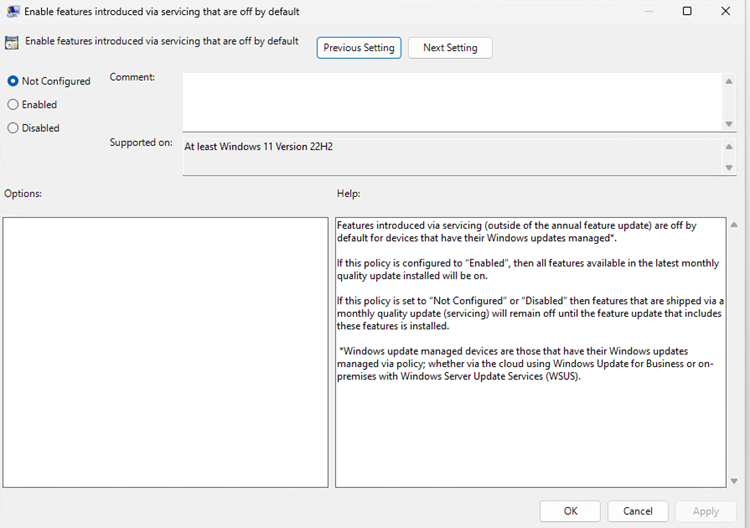Microsoft is testing a new policy in Insider builds of the Windows 11 operating system that enable new features dropped via updates immediately.

New features land in a number of ways in Windows 11. There is the annual feature update, updates using servicing technology, and also updates via the Microsoft Store. Microsoft calls this constant delivery of updates continuous innovation.
Back in 2019, Microsoft shipped the Windows 10 version 1909 feature update via an enablement package. What that meant was that the update was already on the Windows 10 device, but not yet activated. The enablement package, once installed on the device, would unlock the features of the feature update on the Windows 10 device.
One of the main advantages of the approach was that the update processed quickly in a matter of minutes. Compared to previous feature updates, which could take half an hour or longer to fully proceed, it was a speedier approach.
Microsoft used the same system to deliver all other Windows 10 feature updates that came after Windows 10 version 1909.
Windows 11 and continuous innovation
Microsoft plans to extend the core functionality in Windows 11 further "by releasing new features and enhancements into Windows 11 more frequently".
The features come via serving technology, e.g., a monthly cumulative update or Microsoft Store update, in addition to the yearly major feature updates.
In other words: monthly updates for Windows 11 may also introduce new features in the operating system. Features are rolled out using Controlled Feature Rollout, which means that the new features are enabled gradually.
Windows 11 Policy: Enable features introduced via servicing that are off by default
Microsoft created a new policy that controls these feature drops. On managed devices, all features introduced via servicing are not enabled by default. Organizations may use the new policy to enable these features on managed devices.
Administrators find the policy under Windows Components > Windows Update > Manage end user experience > Enable features introduced via servicing that are off by default in the Group Policy editor, or under Policy > Config > Update > AllowTemporaryEnterpriseFeatureControl (Configuration Service Provider (CSP)).
When the policy is set to enabled, all "off"-features that were delivered to the device using servicing are enabled on the next reboot of the system. All future features delivered via servicing updates will be enabled by default immediately.
Keeping the default setting or setting it to off prevents the early installation of these features. They will be turned on after a device is updated to the next annual feature update.
When an administrator switches the policy back to disabled after it was enabled, all features delivered via servicing will be turned off again on the next reboot.
The policy is available in Windows 11 Insider Preview Build 25295 at the time of writing.
Closing Words
The policy does not seem to apply to non-managed Windows 11 devices. These get features enabled automatically and the only recourse seems to be to block certain updates from being installed. The approach is not practical, as this would mean that security updates do not get installed on the Windows 11 device either.
Now You: which do you favor? Constant feature drops or one major feature drop a year? (via Deskmodder)


_story.jpg)
3175x175(CURRENT).thumb.jpg.b05acc060982b36f5891ba728e6d953c.jpg)
Recommended Comments
There are no comments to display.
Join the conversation
You can post now and register later. If you have an account, sign in now to post with your account.
Note: Your post will require moderator approval before it will be visible.